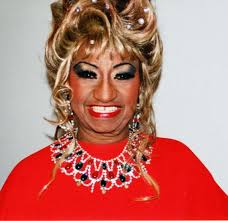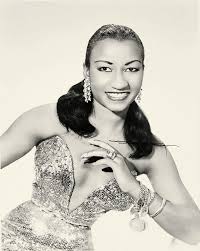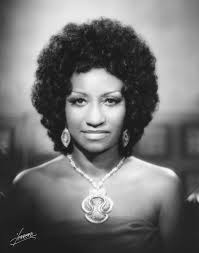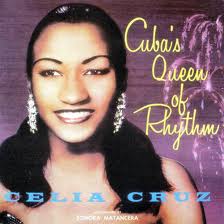“I’m the queen because there is no one else!”

April, 2, 2002
By phone from her home in Fort Lee, New Jersey
I traveled to Cuba for ten days in late 2001, an eye, ear and mind opening journey. It was a musical tour organized by Afropop Worldwide (a fantastic resource for world music fans on NPR and the web (www.afropop.org) and led by Afropop nabob Sean Barlow and author/singer/songwriter/Cuban music maven Ned Sublette. The end result was a five-part piece that ran in the Boston Herald and a vastly enhanced appreciation for Cuban culture.
When I learned that Celia Cruz, the Cuban-born 76-year-old Queen of Salsa, was scheduled to play at Boston’s Symphony Hall with opening act Gilberto Santa Rosa on April 7, 2002, I had to see her. And talk to her.
I set up an advance phone interview, but was told that it would have to be conducted in Spanish because Celia did not speak English, even though she had lived in the U.S. for more than 40 years. I suspected her English was a lot better than my Spanish, but you don’t argue with a queen. I started searching for a Spanish-speaking colleague to act as my translator/intermediary. No one at the Herald, it seemed, spoke fluent Spanish (which says something about the sorry state of diversity at the newspaper, but that’s another topic). Stephanie Schorow, a fellow features scribe who has gone on to write six non-fiction books about Boston, puede hablar más español que yo. I gave her a list of questions I wanted to ask and managed to overcome her reluctance to demonstrate her Spanish-speaking abilities with the great Celia Cruz.
Stephanie started out by apologizing for her bad Spanish. Celia laughed. “Don’t worry,” she said, “my English is not very good.”
You have so much energy. You seem as full of life as a much younger person. What is your secret?
[Laughs] I don’t have a secret. Okay, I take care of myself. I’m a person who doesn’t smoke and doesn’t drink. I only sing and rest. To be on stage for an hour or an hour and a half, I have to rest or I can’t have all this energy.
Your press release says you perform 300 concerts a year. That’s a lot. Do you really do that many?
Yes, I think so. I work, at the least, 10 months a year. It’s not that I want to do this, but it’s for all of you! [laughs].
And you perform all over the world still?
Of course. Look, some are in the United States, some are in Latin America, because I go to Chile, Argentina – but not to Peru now because it isn’t so good there now. I go to Venezuela, Mexico. Last year we played in Finland, Poland and Germany, and three times in Italy.
Is it possible for people in cold places like Finland to understand salsa?
Oh yes. Look, first, it’s cold when you first arrive, but then it’s summer there. And also there are many people there from Venezuela, from Cuba, from Puerto Rico, many people from Colombia, many people from Peru, so many people from Latin America know me. People from all these places come to see me. There are many Latinos all over Europe.
Is it difficult to be the queen of salsa?
Ah, no. It’s not very difficult, because I’m not the queen of anything! [laughs]. It’s just that I’ve spent so many years doing this. There are not many other women dedicated to this.Therefore, I’m the queen because there is no one else! Oh, there are a few other women who sing salsa, like La India, but most of the other girls sing merengue. They don’t put their heart into singing salsa. Therefore I’m the queen of salsa because there is no one else!
After living in the United States for so long and performing with so many musicians from all over Latin America, is your music still Cuban or is it more international now?
Well, look, salsa has roots in Cuban music So you can’t say they’re different. Because you play Cuban music with piano or conga or bongo or timbales. The major instruments that are used in Cuban music are the same instruments that you use to play what we call salsa. Except when I started the instruments weren’t electronic. Now the musicians play electric keyboard, electric guitar. But when I was starting out we didn’t have electric guitars. We had to play with a grand piano. We had another kind of sound, but it has stayed essentially the same.Sure, we have new arrangements, we have new songs, new styles, but the music is essentially the same.
What do you think of the success of Buena Vista Social Club?
These cute little elderly men were a novelty because they played songs that seemingly no one else had played before. But they were getting old. They didn’t have any new songs they could play. They couldn’t pull all-nighters anymore. But Buena Vista Social Club went boom! Because this American filmmaker wanted to document this music before it was too late [American guitarist Ry Cooder was the key figure in organizing the Buena Vista Social Club recording sessions; the documentary film about the sessions was directed by Wim Wenders, a German].
After living in the United States for so many years, did it bother you to see this Buena Vista Social Club get all this attention and publicity?
This American went to Cuba. Without him no one would have known who these guys were. They did a very good publicity campaign. They made a documentary with very good promotion. Everybody heard about it. For example, I’ve never had a promotion like that ever. Understand, I’m not saying they’re the best musicians in Cuba, but with the promotion about their songs and their age they became more famous for this reunion than anybody else. But otherwise people in Havana didn’t know about them. The thanks go to Ry Cooder for bringing them to people’s attention, otherwise no one would have known who they were.
Do you hope the day will come when you can sing in Cuba again?
Yes, someday. But 40 years ago I left Cuba and I don’t want to go back while this [communist] system is still there. I can go back, but I don’t want to go back. Listen, when my mother died, they didn’t give me permission to go back for her burial. And I couldn’t do anything. It’s because of her that I am doing this – singing and performing – but I couldn’t go back to bury her. But someday maybe I’ll go back. Who knows? Everybody asks me that question. But no, I won’t go. I won’t go. Everybody says everything is fine there, but it isn’t fine, so I’m not going.
We had the first Latin Grammy Awards in 2000. What did you think?
I think, “At last!” But the Latin Grammys caused many disagreements. It’s about who’s selling and who’s not selling and it’s a mess. There’s discord about who’s going to get it. But I’m going to disappear from the stage and somebody else is goign to take my place and win a Grammy. I think that’s great.
You have a new song, “Corazon de Rumba,” on your new album [“La Negra Tiene Tumbao” (loosely, The Black Lady’s Got the Beat)]. Some people think it’s the story of your life.
No, this song was written by Mario Diaz. He is a Dominican. A month ago I met him in Santo Domingo. he is a young man. I suppose he could have written the song with me in mind. The song speaks of Cuba indirectly. And it talks about me indirectly becasue it’s a rumba song. But I don’t want to say that it’s the story of my life.
You sing a couple of marvelous duets with your old friend Johnny Pacheco on the album. How did you know Pacheco and you would be so simpatico? [Cruz career in the U.S. took off in the mid 1970s when she recorded a series of albums with the Dominican-born flutist.]
Pacheco was a big admirer of La Sonora Manteca [the group with which Celia started her career in Havana in 1950]. So he had a group called Pacheco y su Tumbao and he played the music of La Sonora. He imitated that sound and I liked that. He’s very talented. They asked me when I was preparing the album, “Who would you like to sing with?” and I said, “Pacheco.”
Were you ever pressured to sing in English?
Never! When I was in “The Mambo Kings” I did a number by Pacheco and they put subtitles on it. I did sing “Ob-La-Di Ob-La-da” by the Beatles, but I sang it in Spanish. But never ever did anybody ask me to do this [sing in English] because they knew that I defended myself well from this and knew that I shouldn’t sing in English. I never had pressure from an company to do this.
Do you plan to retire someday?
[In English] Never! Never in my life! [laughs]
[Celia Cruz performed less frequently in the year following this interview because she was undergoing treatment for cancer. She died on July 16, 2003.]



